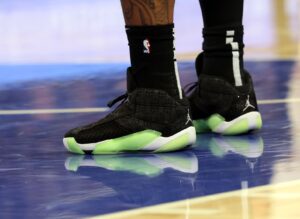Russell Westbrook‘s jaw-dropping statistical season has made many believe that failing to reward him the NBA’s Most Valuable Player award would be the equivalent of stealing candy from a baby – you just don’t do it.
This season has witnessed more triple-doubles (96) than ever before, with Westbrook at the forefront of the movement. As most people know by now, “The Brodie” is on pace to average a triple-double for the entire season. That feat hasn’t been accomplished since the 1961-62 campaign. What makes Westbrook’s season even more impressive is his ability to carry Oklahoma City’s offensive burden on a regular basis. Advanced metrics prove this in a number of ways.
Is Russell Westbrook the NBA’s Most Valuable Player?
Usage Rate
Usage rate estimates the percentage of a team’s possessions that a player ‘uses’ while he’s on the court. Westbrook’s usage rate on the Thunder is a staggering 41.9 percent, which is set to shatter Kobe Bryant‘s current record of 38.7 percent from the 2005-06 season. Westbrook’s usage rate indicates how much his team relies on him to produce. That isn’t necessarily a good thing.
When a player’s usage rate goes up, his efficiency tends to go down. That is the case for Westbrook. He chucks a league-leading 24 field goal attempts per game and makes only 41.8 percent of them, giving him the lowest field goal percentage among the four leading MVP candidates (Westbrook, James Harden, Kawhi Leonard, and LeBron James). But despite his shooting inefficiency, Westbrook leads the NBA in assist percentage at 56.5 percent, meaning that he sets up over half of his teammates’ made field goals while he’s on the court.
Box Plus/Minus
The most eye-popping advanced metric that supports Westbrook’s MVP case is BPM (Box Plus/Minus).
BPM attempts to measure a player’s impact compared to the league average player, based on box score performance and relative team success. Westbrook leads the NBA with an incredible 14.8 BPM. That number is on pace to be the highest BPM of all time by nearly two points. The current BPM record-holder among qualified starters is James, who had a 13.0 BPM in the 2008-09 season. Westbrook’s BPM indicates that when he’s playing well, his team tends to reap the benefits. That’s further proven by Oklahoma City’s .823 winning percentage (28-6 win-loss record) in games where Westbrook records a triple-double.
The Case Against Westbrook
Even with all of Westbrook’s statistical achievements this season, critics can still discredit his MVP case because he’s not on a true title contending team. And that’s certainly a fair point.
For most of NBA history, the MVP has been awarded to the best player on the best team (or one of the best, at least). Giving Westbrook the MVP this season would end that trend, as OKC is clearly not a title contender. Those who vote for the MVP award likely won’t change their voting tendencies to reward an incredible statistical season. The main reason for that could be Westbrook’s reputation as a ball hog (which is supported by his high usage rate).
The Case for Westbrook
Voter tendencies and high usage rate aside, Westbrook’s impact on the Thunder cannot be overstated. Just think about what Oklahoma City’s record would be without Westbrook!
The Thunder currently have 40 wins with Westbrook; one could argue that they’d have somewhere around 19 to 21 wins without him. It’s a bold hunch, but based on how much the Thunder rely on Westbrook to produce, it’s not a crazy one.
Gut Feeling
Westbrook will not win the 2016-17 MVP award. Who will? Keep an eye out for future LWOPB articles which will attempt to answer that question.
Stats are accurate as of March 22nd before play.
Main Photo:






